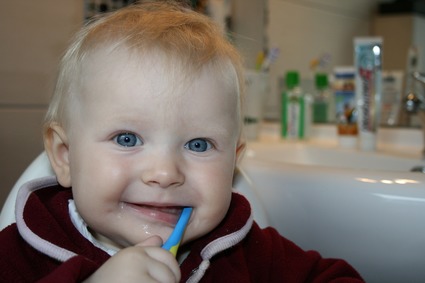
Some babies may get their first tooth once they are around six months of age, while others may even need to wait for 14 months. Children develop all their milk teeth by their third birthday.
Three to four months old infants often start showing the symptoms of teething before the emergence of the first tooth. They start drooling a lot, show anxiousness, and try to chew various things that they can lay their hands on. Surprisingly, genetic factors also affect the timing of teething.
The typical pattern observed in the babies suggests that lower central incisors erupt first, followed by the upper middle two teeth. In most cases, the first tooth emerges without causing discomfort or pain to the baby. However, general dentists or pediatric dentists do come across babies who often cry a few days or weeks before their first tooth pops up. They may also show symptoms of low-grade fever. The area where the first tooth starts emerging may turn red. If the baby starts showing signs of discomfort due to teething, it is advisable to clean the infant’s gums gently with a clean finger, and then wipe the same with a wet cloth.
Teething gels and pain relievers for babies are readily available on the market. But, let your dentist prescribe the same after checking the infant’s gums properly.
Some babies are even born with a single tooth, known as the natal teeth. The roots of such teeth are often found to be undeveloped, loose, and need to be removed within the first few hours after the baby’s birth.
Parents often mistakenly consider Epstein’s Pearls (whitish-yellow dots) on the baby’s gum line as its first tooth. These dots are nothing to worry about, and they go away naturally after a few days.
Baby’s Teeth Also Need Attention And Care
Baby teeth play a crucial role when it comes to speaking clearly and chewing. Thus, keeping them decay-free is essential. No matter if the child is bottle-fed or breastfed, it needs special care for its teeth.
The Baby’s gums also need some primary care before the arrival of the tooth. Parents can wipe the gums with a piece of soft moistened cloth after feedings and before sleeping as well. Doing the same would ensure the mouth remains free of plague-causing bacteria.
Just like in the case of adults, baby teeth are prone to decay and infections. Any changes in the tooth’s structure or even white spots on the surface should not be ignored. If corrosion is spotted during an early stage, the bacteria development can be stopped with the help of fluoride varnish treatment.
Dentists recommend soft toothbrushes with a small head to parents along with special baby toothpaste available in the market. Fluoridated toothpaste is only recommended after a child learns to spit out as excessive ingestion of fluoride can result in fluorosis of tooth enamel. As soon as the first tooth emerges through the baby’s gums, parents can start brushing the tooth gently. The amount of toothpaste should be as small as a grain of rice. The child may require assistance in cleaning and oral care until he or she turns six years of age.
Beware Of Tooth Decay And Symptoms
Some parents let their baby sleep with a milk bottle, and this is how the trouble begins. Pediatric dental care experts, like those at top Roswell Dentists, ask mothers to keep the baby’s pacifiers properly disinfected. The same rule applies to the milk bottle. It needs to be kept away from the infant while it sleeps.
Pediatricians suggest tooth decay (also referred to as childhood caries) may affect six out of ten children below five years of age. It can start from the first tooth itself according to the data released by the American Academy of Pediatrics.
No matter how old the baby is, the acid-producing bacteria can start accumulating in the mouth and trigger infection as well as decay. Even the baby’s mother can end up transmitting oral bacteria by merely sharing a spoon with the infant.
Unfortunately, many parents ignore the child’s oral care as they believe bacteria may not cause any damage at the early stage. Thus, the bacteria keep on becoming more vicious and create acid from sugars, and food particles on the teeth, further triggering decay.
In toddlers, the bacteria can travel much faster from the tooth to its roots, and then the jaw bone. So, as soon as the infant turns six months of age, it is advisable to visit a pediatric dentist for a check-up.
Dental care can be made a pleasant experience for the child, right from the beginning. Remember, children can be treated at kids-friendly general dentistry or pediatric dentistry. If you are looking for the best Roswell Dental Care, please visit us at TruCare Dentistry.
